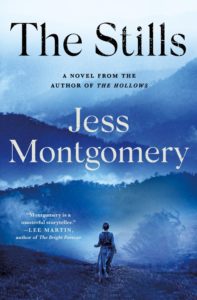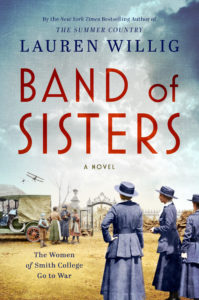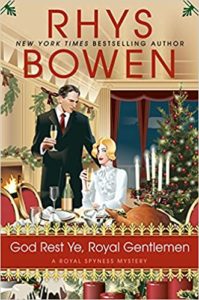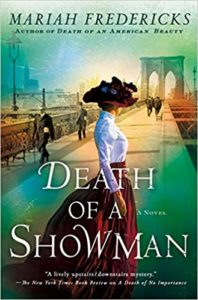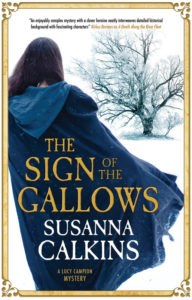After we closed the store and my reading was slightly less proscribed by authors visiting or the latest new thing, I realized that one of the genres I truly love is historical mysteries. The range is so wide – in story telling style, in time period, in characters, and the armchair history lessons always, always add to my reading enjoyment. The fact that the books are set in the past makes the detective rely much more on old fashioned, golden age style sleuthing methods, another attraction, as far as I’m concerned. Thanks to Mystery Scene Magazine as well as my own reading, I find I read pretty widely in this subgenre. Here are my 10 favorites this year. One of them I liked so much it’s on my all around top 10 list (stay tuned!)
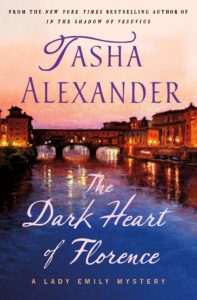 The Dark Heart of Florence, Tasha Alexander. Tasha Alexander writes one of the most reliably entertaining series in mystery fiction – every book has a complex plot, often a dual timeline, a bit of romance, plus the reader gets to go on some armchair travel and learn a bit of history to boot. In this latest Lady Emily outing, her dishy husband, Colin, takes her to Florence, along with her friend Cecile for cover, as he works on something so secret for the Crown that he can’t even tell Emily. When they arrive at their borrowed Florence villa, one of the workers plunges to his death, and as Colin is off working for the crown, Emily investigates the crime which has ties back to the 15th century. The dual time period really adds to the richness of the storytelling in the novel. This was another well told, wildly enjoyable book from the talented Alexander.
The Dark Heart of Florence, Tasha Alexander. Tasha Alexander writes one of the most reliably entertaining series in mystery fiction – every book has a complex plot, often a dual timeline, a bit of romance, plus the reader gets to go on some armchair travel and learn a bit of history to boot. In this latest Lady Emily outing, her dishy husband, Colin, takes her to Florence, along with her friend Cecile for cover, as he works on something so secret for the Crown that he can’t even tell Emily. When they arrive at their borrowed Florence villa, one of the workers plunges to his death, and as Colin is off working for the crown, Emily investigates the crime which has ties back to the 15th century. The dual time period really adds to the richness of the storytelling in the novel. This was another well told, wildly enjoyable book from the talented Alexander.
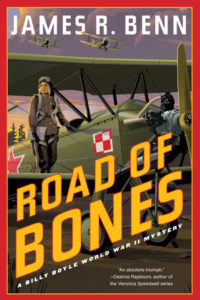 Road of Bones, James R. Benn. For new readers, the Billy Boyle books are set during WWII and feature an army captain, Billy, who investigates the murders that occur on the edges (or directly inside of) the war. It’s now 1944, and author James Benn plunges Billy and his sidekick Big Mike directly into the action. Road of Bones begins and ends with two bravura action scenes, a type of writing at which Benn excels. The opening scene is set inside a bomber seeing direct action. Billy is a passenger on the way to the USSR, but he steps in at one point, earning him the respect of the pilots on board. It’s kind of like the opening scene of Saving Private Ryan in its utter intensity and brutality. It’s the kind of scene that once you’re finished reading it, you need to give yourself a mental shake to be able to move on to the rest of the story. The plane Big Mike was in has disappeared into the wilds of the USSR and while Billy is crazy to find him, there’s not much he can do about it at his new post, Poltova, where he’s to investigate the deaths of an American and a Russian soldier.
Road of Bones, James R. Benn. For new readers, the Billy Boyle books are set during WWII and feature an army captain, Billy, who investigates the murders that occur on the edges (or directly inside of) the war. It’s now 1944, and author James Benn plunges Billy and his sidekick Big Mike directly into the action. Road of Bones begins and ends with two bravura action scenes, a type of writing at which Benn excels. The opening scene is set inside a bomber seeing direct action. Billy is a passenger on the way to the USSR, but he steps in at one point, earning him the respect of the pilots on board. It’s kind of like the opening scene of Saving Private Ryan in its utter intensity and brutality. It’s the kind of scene that once you’re finished reading it, you need to give yourself a mental shake to be able to move on to the rest of the story. The plane Big Mike was in has disappeared into the wilds of the USSR and while Billy is crazy to find him, there’s not much he can do about it at his new post, Poltova, where he’s to investigate the deaths of an American and a Russian soldier.
While Benn writes with all the detail of war – and this slice of the war seems especially grim and brutal – he also seems to have a love for the traditional village mystery, in his own way. Like Miss Marple, Billy often finds a solution by comparing the people he’s investigating in the present to some of the criminal types he encountered in the past as a beat cop back in Boston. It’s this type of parallel thinking that helps him to solve this complex crime. Benn a gives the reader a good look at the attitudes – and fear – in Stalinist Russia. This is a grim story but it’s not all grim – there’s a very smart mystery at the center. This is another great read from a truly talented writer.
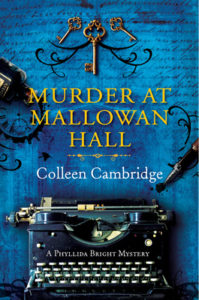 Murder at Mallowan Hall, Colleen Cambridge. Phyllida Bright, appearing in this series debut, works as the housekeeper for Agatha Christie and her husband, Max Mallowan. As the book opens, Mrs. Bright unfortunately discovers a body in the Mallowan’s library, right in the middle of a house party. The dead man was a reporter who had showed up late the night before, saying he was there to interview Mrs. Christie. Mrs. Bright pulls herself together – she’d been a nurse during the war – and before she even notifies the butler (gasp) she calls the police. This book is a delicious combination of Downton Abbey and a meta-play on a Christie novel (obviously, The Body in the Library). The Downton Abbey bit is Cambridge’s attention to household detail, and the way Mrs. Bright runs that household. In true Christie fashion there’s more than one murder and more than one red herring. Mrs. Bright wraps things up almost despite the police, though they help detain the villain at the end. Agatha Christie the person plays a very peripheral part in the proceedings, but Agatha Christie the writer haunts every page of this delightful book that both pays homage to the Queen of Crime, but also embroiders on her work with a fresh character and a fresh look at a part of her life. This is a wonderful series debut.
Murder at Mallowan Hall, Colleen Cambridge. Phyllida Bright, appearing in this series debut, works as the housekeeper for Agatha Christie and her husband, Max Mallowan. As the book opens, Mrs. Bright unfortunately discovers a body in the Mallowan’s library, right in the middle of a house party. The dead man was a reporter who had showed up late the night before, saying he was there to interview Mrs. Christie. Mrs. Bright pulls herself together – she’d been a nurse during the war – and before she even notifies the butler (gasp) she calls the police. This book is a delicious combination of Downton Abbey and a meta-play on a Christie novel (obviously, The Body in the Library). The Downton Abbey bit is Cambridge’s attention to household detail, and the way Mrs. Bright runs that household. In true Christie fashion there’s more than one murder and more than one red herring. Mrs. Bright wraps things up almost despite the police, though they help detain the villain at the end. Agatha Christie the person plays a very peripheral part in the proceedings, but Agatha Christie the writer haunts every page of this delightful book that both pays homage to the Queen of Crime, but also embroiders on her work with a fresh character and a fresh look at a part of her life. This is a wonderful series debut.
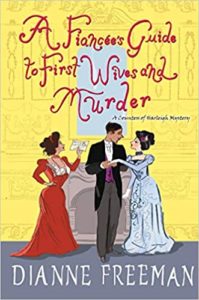 A Fiancee’s Guide to First Wives and Murder, Dianne Freeman. The sparkling fourth installment to Dianne Freeman’s insanely enjoyable Frances, Lady Harleigh series finds the intrepid Frances on the verge of marriage to her beloved George, only to discover, practically on the eve of her wedding, that George’s wife has appeared. Of course, it’s a misunderstanding, but the social damage is done. Irena, the woman making the claim, appears not only demented but in danger, as she’s been receiving threatening letters. When Irena’s marital status has been more or less cleared up (and to give it away gives away a portion of this clever plot), Lady Harleigh agrees to take her in while George looks into the matter. Frances and George get to sleuthing, but unfortunately the next day Irena is discovered dead in Frances’ garden. The mystery part of the novel is golden age in that there is a pretty tight circle of suspects, every clue has a purpose, and the resolution is suitably surprising yet also makes sense. The characters are interesting and sharply defined, the societal milieu is beautifully portrayed, and Frances is every bit the intelligent, independent woman who has found her soul mate in George. This series has quickly become a favorite of mine.
A Fiancee’s Guide to First Wives and Murder, Dianne Freeman. The sparkling fourth installment to Dianne Freeman’s insanely enjoyable Frances, Lady Harleigh series finds the intrepid Frances on the verge of marriage to her beloved George, only to discover, practically on the eve of her wedding, that George’s wife has appeared. Of course, it’s a misunderstanding, but the social damage is done. Irena, the woman making the claim, appears not only demented but in danger, as she’s been receiving threatening letters. When Irena’s marital status has been more or less cleared up (and to give it away gives away a portion of this clever plot), Lady Harleigh agrees to take her in while George looks into the matter. Frances and George get to sleuthing, but unfortunately the next day Irena is discovered dead in Frances’ garden. The mystery part of the novel is golden age in that there is a pretty tight circle of suspects, every clue has a purpose, and the resolution is suitably surprising yet also makes sense. The characters are interesting and sharply defined, the societal milieu is beautifully portrayed, and Frances is every bit the intelligent, independent woman who has found her soul mate in George. This series has quickly become a favorite of mine.
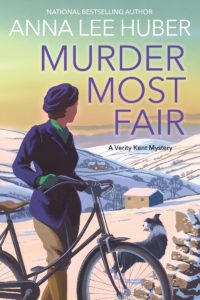 Murder Most Fair, Anna Lee Huber. The fifth novel in Anna Lee Huber’s Verity Kent series finds Verity surprised by the appearance of her German great aunt, Ilse. She’s surprised for one thing because it’s 1919, and in England, Germans aren’t especially beloved; and for another she knows her aunt is elderly and fragile and wonders why she’s made the arduous journey to her niece’s side. Her aunt has appeared with a new and beautiful young maid, as her long time maid has died of the Spanish flu. While this book is very much set in 1919, it’s also echoed in today’s universe, where we are dealing with a pandemic that’s not quite over and that has caused a massive amount of loss. Because her aunt is so elderly and so fragile, and because Germans are so reviled in London, Verity decides the best place for her would be her parent’s home in the Yorkshire Dales. Verity herself is returning home after a long time away. As anyone who returns to their childhood home after a long absence has found – things have changed. Verity’s surviving brothers, Freddy and Tim, are also veterans dealing with the war’s aftermath in different ways. Her mother is angry that Verity has been away for so long. And Sidney is acclimating himself to Verity’s childhood home. As he’s a certified war hero with a medal to prove it, things are easier for him, though there’s still a bit of a gulf between him and Verity as she refuses to give in to her grief.
Murder Most Fair, Anna Lee Huber. The fifth novel in Anna Lee Huber’s Verity Kent series finds Verity surprised by the appearance of her German great aunt, Ilse. She’s surprised for one thing because it’s 1919, and in England, Germans aren’t especially beloved; and for another she knows her aunt is elderly and fragile and wonders why she’s made the arduous journey to her niece’s side. Her aunt has appeared with a new and beautiful young maid, as her long time maid has died of the Spanish flu. While this book is very much set in 1919, it’s also echoed in today’s universe, where we are dealing with a pandemic that’s not quite over and that has caused a massive amount of loss. Because her aunt is so elderly and so fragile, and because Germans are so reviled in London, Verity decides the best place for her would be her parent’s home in the Yorkshire Dales. Verity herself is returning home after a long time away. As anyone who returns to their childhood home after a long absence has found – things have changed. Verity’s surviving brothers, Freddy and Tim, are also veterans dealing with the war’s aftermath in different ways. Her mother is angry that Verity has been away for so long. And Sidney is acclimating himself to Verity’s childhood home. As he’s a certified war hero with a medal to prove it, things are easier for him, though there’s still a bit of a gulf between him and Verity as she refuses to give in to her grief.
When her aunt’s maid is discovered murdered, Verity and Sidney snap into detecting mode, making an appealing and intelligent sleuthing couple. While I enjoyed the mystery and the threads that lead to a solution, what I thought was so strong about this book was the depiction of Verity’s grief. The meticulous character delineation that is a hallmark of Huber’s writing makes it all the more powerful. This is a beautifully written and told story.
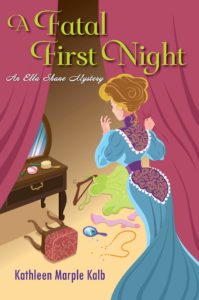 A Fatal First Night, Kathleen Marple Kalb. This is the second in Kathleen Kalb’s delightful series about opera star Ella Shane, who is working in New York City in 1899. She and her cousin Tom run an opera company and live agreeably together in a large brownstone with Ella’s parrot, Montezuma. These books have a really vivacious quality, matching Miss Ella’s own. Not only is Ella a working woman in 1899, she sings men’s parts – she’s what was known as a “trouser diva”. Her first nights tend to be problematic, however. In this book, though the stage portion of her new show goes perfectly, when she comes off stage she discovers one of her co-stars in his dressing room, covered in blood, a dead man at his feet. The gentle singer is hauled off to the Tombs and Ella tries to wrap her head around his guilt. This story has many interlocking pieces, all juggled (seemingly effortlessly) by the skillful Kalb. As in the last novel, it’s Ella who gets both the last word and the last lick and vanquishes her foe.
A Fatal First Night, Kathleen Marple Kalb. This is the second in Kathleen Kalb’s delightful series about opera star Ella Shane, who is working in New York City in 1899. She and her cousin Tom run an opera company and live agreeably together in a large brownstone with Ella’s parrot, Montezuma. These books have a really vivacious quality, matching Miss Ella’s own. Not only is Ella a working woman in 1899, she sings men’s parts – she’s what was known as a “trouser diva”. Her first nights tend to be problematic, however. In this book, though the stage portion of her new show goes perfectly, when she comes off stage she discovers one of her co-stars in his dressing room, covered in blood, a dead man at his feet. The gentle singer is hauled off to the Tombs and Ella tries to wrap her head around his guilt. This story has many interlocking pieces, all juggled (seemingly effortlessly) by the skillful Kalb. As in the last novel, it’s Ella who gets both the last word and the last lick and vanquishes her foe.
Kalb writes with vivid assurance. Her stories are well paced and well layered. Ella’s matrix – the characters who surround her – are as interesting and flawed yet human as she is herself, as is the theatrical setting. While in this novel the mystery part was about of equal importance to all the other things happening in Ella’s life – mainly her romance with her British swain Gil – I didn’t care a bit. This book is by a woman who knows how to tell a story.
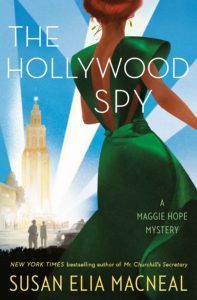 The Hollywood Spy, Susan Elia MacNeal. In this novel, Maggie Hope has gone to Hollywood. She’s been summoned by her old friend, RAF Commander John Sterling, who has lost his fiancée in an apparent accident. It’s 1943 in Los Angeles and things are not as they appear. Hollywood is the perfect setting for this theme – a universe that’s all shiny surface, with all kinds of undercurrents below. While the message of the US at war is that everyone is in it together, MacNeal brings into stark relief the rise of the KKK, who were following the rise of Hitler and hoping for a complete takeover after the war. The book is saturated in racism, from Maggie’s discomfort at Schwab’s when she notices a black nanny who cannot sit down next to her small white charge, to a depiction of the Zoot Suit riots.
The Hollywood Spy, Susan Elia MacNeal. In this novel, Maggie Hope has gone to Hollywood. She’s been summoned by her old friend, RAF Commander John Sterling, who has lost his fiancée in an apparent accident. It’s 1943 in Los Angeles and things are not as they appear. Hollywood is the perfect setting for this theme – a universe that’s all shiny surface, with all kinds of undercurrents below. While the message of the US at war is that everyone is in it together, MacNeal brings into stark relief the rise of the KKK, who were following the rise of Hitler and hoping for a complete takeover after the war. The book is saturated in racism, from Maggie’s discomfort at Schwab’s when she notices a black nanny who cannot sit down next to her small white charge, to a depiction of the Zoot Suit riots.
MacNeal, as always, tells an incredible story, including the actual detection part, as Maggie quickly proves that Gloria, John’s fiancée, was indeed murdered. Maggie’s investigation takes her far and wide, deep into a KKK plot. But MacNeal also gives the reader a glimpse of 1943 Hollywood, sprinkling her narrative with people like Walt Disney, Linus Pauling, Hattie McDaniel, Igor Stravinsky and others, as well as the glamor of places like the Chateau Marmont and the Garden of Allah, the bohemian hangout where Gloria was murdered. This is a great read, as always, but it’s also a thoughtful and scary look at racism in 1943 that certainly brings the reader’s mind many decades forward to today. Long live Maggie Hope and the thoughtful skill of her creator.
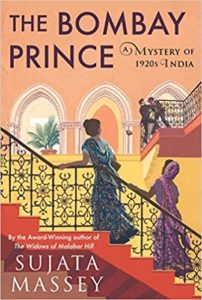 The Bombay Prince, Sujata Massey. I love this series. Set in India just before independence, series heroine Perveen Mistry works in her father’s law firm. At the time, she was the only female lawyer in Bombay, allowed to settle contracts and wills but not allowed to argue in court. As the book opens, Perveen is visited by a young woman, Freny Cuttingmaster, who asks Perveen if her college can expel her for not attending the parade for the Prince of Wales, who is coming for a visit. Freny is secretly part of a group advocating for Indian independence. Perveen ultimately advises her to feign illness and stay home, but Freny, a devout Parsi, refuses to tell a falsehood of any kind. This book addresses two issues: one, the burgeoning fight for independence from the British, led by Gandhi, and, as always in these novels, a reflection on the place of the female in society
The Bombay Prince, Sujata Massey. I love this series. Set in India just before independence, series heroine Perveen Mistry works in her father’s law firm. At the time, she was the only female lawyer in Bombay, allowed to settle contracts and wills but not allowed to argue in court. As the book opens, Perveen is visited by a young woman, Freny Cuttingmaster, who asks Perveen if her college can expel her for not attending the parade for the Prince of Wales, who is coming for a visit. Freny is secretly part of a group advocating for Indian independence. Perveen ultimately advises her to feign illness and stay home, but Freny, a devout Parsi, refuses to tell a falsehood of any kind. This book addresses two issues: one, the burgeoning fight for independence from the British, led by Gandhi, and, as always in these novels, a reflection on the place of the female in society
Sadly Freny is discovered dead shortly after the parade, an apparent suicide. She had fallen from an upper floor in one of the college buildings. Perveen is sure Freny’s death is not a suicide, and she steps in as an advocate at the inquest for Freny’s parents, with the blessing of her father who accompanies her to court and lets her speak for the Cuttingmasters. It’s the first time she’s spoken in the courtroom. This is the most traditional book so far in this series, in terms of it being a straight up golden age style, almost locked room mystery. Massey has all the chops – plot, character, setting and just pure writing. A stand out in every way.
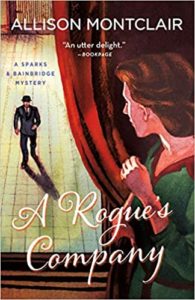 A Rogue’s Company, Allison Montclair. This has very quickly become one of my favorite and most anticipated series. Set in London just post war, the main characters are Iris Sparks and Gwen Bainbridge, two opposites who work like clockwork together. Iris is single and Gwen is a widowed mother living with her in-laws, and the two run a marriage bureau called the “Right Sort”. Each book opens with the approach of a client, and that sets off whatever delightful chain of events Montclair has in store for her reader. The approach of their first African customer throws them off a tiny bit, but the ladies rally and agree to help find proper, polite Mr. Daile a match. As the women prepare to match Mr. Daile, Gwen feels something is off about him – she thinks there is something he’s not sharing with them, but they press ahead regardless.
A Rogue’s Company, Allison Montclair. This has very quickly become one of my favorite and most anticipated series. Set in London just post war, the main characters are Iris Sparks and Gwen Bainbridge, two opposites who work like clockwork together. Iris is single and Gwen is a widowed mother living with her in-laws, and the two run a marriage bureau called the “Right Sort”. Each book opens with the approach of a client, and that sets off whatever delightful chain of events Montclair has in store for her reader. The approach of their first African customer throws them off a tiny bit, but the ladies rally and agree to help find proper, polite Mr. Daile a match. As the women prepare to match Mr. Daile, Gwen feels something is off about him – she thinks there is something he’s not sharing with them, but they press ahead regardless.
While Gwen and her mother in law had reached an armed truce of sorts in the last book regarding her son’s education, the arrival of her father in law blows everything to smithereens as he refuses to compromise and treats his wife like an afterthought, abandoning her each night for his club. About half way through the book, Gwen and her father in law are kidnapped, and the distraught Lady Bainbridge reaches out to Iris for help. This is the most personal of the books to date. Putting Gwen in danger and allowing her to ultimately realize the many resources she actually has at her disposal fleshes her character. These books have a dash of adventure, a dash of (often thwarted, in Gwen’s case) romance, a clever mystery, and much wit and intelligence. May this series be a long one.
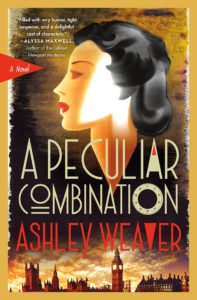 A Peculiar Combination, Ashley Weaver. Electra McDonnell is a thief. She and her uncle Mick make a living on the shady side of the street, picking locks and cracking safes. It’s 1940, London, and the pair are taking advantage of the general uproar of the war to ply their trade, with abandoned houses making their task easier. On the night the book opens, though, Electra has a bad feeling. She is sure she and her uncle are being watched. While their break-in goes without incident, after it’s over, they are arrested. But as Ellie watches scenery pass by through the window of the police car, she sees they aren’t headed to the police station or to jail, but to Belgravia. She and her uncle Mick are escorted inside a posh house, separately, and ultimately interrogated by one Major Ramsey, who questions them both and then offers a proposition. All charges will be dropped if Ellie and her uncle agree to safe-crack for the war effort. While Ellie’s temper often gets the best of her, she ultimately agrees.
A Peculiar Combination, Ashley Weaver. Electra McDonnell is a thief. She and her uncle Mick make a living on the shady side of the street, picking locks and cracking safes. It’s 1940, London, and the pair are taking advantage of the general uproar of the war to ply their trade, with abandoned houses making their task easier. On the night the book opens, though, Electra has a bad feeling. She is sure she and her uncle are being watched. While their break-in goes without incident, after it’s over, they are arrested. But as Ellie watches scenery pass by through the window of the police car, she sees they aren’t headed to the police station or to jail, but to Belgravia. She and her uncle Mick are escorted inside a posh house, separately, and ultimately interrogated by one Major Ramsey, who questions them both and then offers a proposition. All charges will be dropped if Ellie and her uncle agree to safe-crack for the war effort. While Ellie’s temper often gets the best of her, she ultimately agrees.
The plot is suitably tricky with first one suspect, then another, seeming like the guilty party (there are some missing papers involved), which keeps Weaver’s novel squarely on the Golden age side of things. There are a surfeit of books set during this time period, but this one has a nice twist to it. Having the main character be on the shady side, yet recruited by the war office for her actual skillset, makes this a unique set up. This book had a real snap to it. I loved the characters – especially Ellie – and I loved the twists that Weaver provides for the reader. This is a very welcome addition to the historical mystery field.
Also notable: Jess Montgomery’s The Stills; Lauren Willig’s gripping Band of Sisters; Rhys Bowen’s God Rest Ye, Merry Gentlemen; Mariah Fredericks’ Death of a Showman and Susanna Calkins’ return to the 1660’s with The Sign of the Gallows. All have been reviewed here, and read my interview with the fascinating Lauren Willig here.
